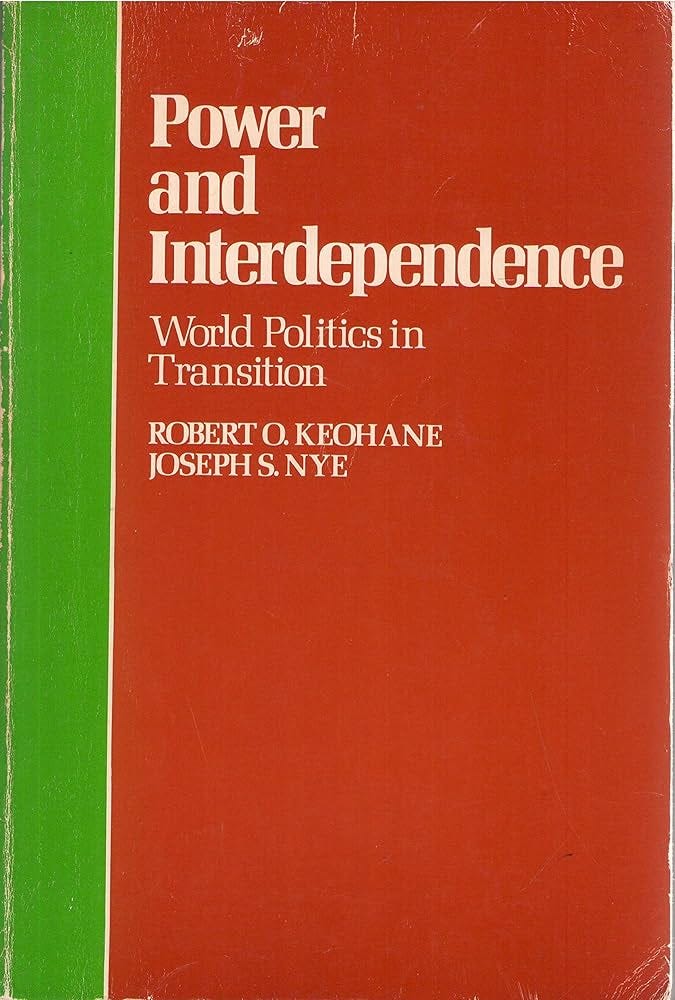This is a reader-supported publication. I give it all away for free but could really use your support if you want me to keep doing this.
NYT: Joseph Nye, Political Scientist Who Extolled ‘Soft Power,’ Dies at 88; He coined the term, arguing that a country’s global influence can’t be built on military might alone. Diplomats around the world paid heed.
Joe Nye was and remains an important figure to me. In the late 1980s, I “sub-taught” (as a teaching assistant leading two sections) with him on his Understanding International Conflicts core course in the late 1980s. The course was famous throughout Harvard as being a must-have undergraduate experience. As such, it was a real plum job to TA the course, as one often would win top ratings doing so, leading to a bonus payment, which I achieved.
I also took his graduate survey seminar — a must-have experience for any grad student in the Government Department.
But the big thrill and impact for me was when he agreed, based on my preliminary presentation, to serve as chair for my dissertation committee, alongside my mentor Adam Ulam, Director of the Russian Research Center, and a young Iranian prof by the name of Houchang Chehabi (the most practically helpful of the three, of course).
Given the nature of my dissertation (comparing Romanian and East German strategies vis-a-vis Soviet domination through the lens of their aid activities on behalf of the Warsaw Pact and Comecon [the USSR’s versions of NATO and the EU]), and my reliance on a tricky collection of proxy data to estimate those secretive relationships, it was key for me to have the academic blessing of someone like Joe, who, as anyone will tell you, was quite generous with his time and — more so — his attention.
In short, Nye could have easily begged off, given his schedule and responsibilities, but he didn’t, and that meant the world to this young man with no connections from a Midwestern public university.
I can’t say I stayed in touch with Prof. Nye once my career began. I remember being jealous when some colleagues of mine at the Center for Naval Analyses landed spots in his Pentagon policy office under Clinton, but I was then too junior for that privilege — as much as I would have treasured it. I was also rebuilding my career at bit at that time, having suffered the fate of being a former Sovietologist of the former Soviet Union.
In effect, I needed to reinvent myself and that perhaps was where Nye’s influence was most crucial to me — particularly his concept of interdependence, which, to me, overshadows even his later, far more famous concept of “soft power.”
For someone, like myself, who instinctively seeks out — and chooses to deal with — “happy endings,” Nye was a beacon of positivity in a very dark and pessimistic field that pretty much limited its sense of progress and optimism to avoiding WWIII — a necessity alright but not a path to any future worth creating.
Nye’s book with Bob Keohane in 1977, Power and Interdependence, became an instant classic and really, for people like me, pointed a way out of the stultifying logic of the Cold War and the bipolar standoff, which had definitely resurged under Reagan in the 1980s — my period of education (Wisconsin 1980-84, Harvard 1984-90). It was like somebody discovered another, countervailing force in the universe that explained why nations came together and cooperated instead of always behaving like they’re were living in a Hobbesian world where all fight all — all the time.
The example cited in the book, that of America’s bilateral and highly interdependent relationship with Canada, made for some dry analysis and yet it was a fascinating breakthrough in thinking that educated a great number of people who later served in the US foreign policy establishment across the post-Cold War era — to include myself.
You could say, with some accuracy, that Thomas Friedman’s career output on globalization was a popular articulation of Keohane and Nye’s seminal work, and that’s not putting down Friedman whatsoever, because his popularization of that logic was extremely influential in its own right — particularly with me, searching as I was, for something to glom onto now that the Soviet threat had crumbled.
I don’t know how to say it any better than to portray Nye’s overall influence (interdependence, soft power) as providing a positive way forward at a very uncertain time (1990s). That influence is easy to dismiss during any subsequent downturn (like today) but that constitutes, in analytic terms, missing the forest for the trees.
Yes, that logic, like globalization itself, peaked in the 2000s by extending itself about as far as it could go on lengthy, globe-spanning value chains, and since then the world has retreated somewhat from that frenzy — and quite logically so as there is no rule that says globalization must advance to the point where every single product consumed involves a value chain spanning the world’s entire slate of economies (a nuttily extreme notion, yes?).
Now, with Asia largely risen (with SE Asia at the plate, India on deck, and Africa in the hole — to employ baseball terms), a certain re-regionalization seeks to backfill those overly drawn-out supply chains bequeathed by Peak Globalization (1990-2008). Simply put, Asia now largely produces for itself, creating the third great demand/production hub in combination with North America and Europe.
That monumental development — all by itself — triggers this re-settling dynamic we’re all now experiencing, where the world has to figure out that trilateral power relationship and the genuine competitions it has unleashed across the Global South.
Is that development an improvement upon the Cold War bipolar order? Good God, of course it is! But it is also more complex and intimidating in some ways because China has successfully held onto its authoritarian model of governance — to the West’s dismay and rather childish disillusionment. For some in the West, this reality can only portend a WWIII pathway of some sort, while, to others — like me, this period is more about the reality that America can no longer play sole global hegemon and it is having a hard time returning to its market-player persona when it’s equally clear that China, while aggressively pushing its brand around the world, is likewise unready and unwilling to play true global hegemon or market-maker to the sum of the global economy.
Thus a period of great adjustment amidst great competition with the rules of this game remaining somewhat unclear because we see the world in one way (poker-like military standoffs) and China sees it another way (a giant global go board awaiting Beijing’s many stones to be placed).
While not forgetting Russia or Europe or India, that’s the key relationship we’re adjusting right now in our world — as we have been for a solid quarter-century.
And, what have we learned?
Have we abandoned Nye’s world of interdependence?
Some argue yes, almost casting Nye as this century’s version of Norman Angell, or the Nobel Peace Prize winning “dupe” who proclaimed that an earlier version of European imperial globalization would prevent what eventually unfolded as WWI and WWII.
Spoiler alert: it didn’t, per Vladimir Lenin’s sharp analysis.
FOREIGN POLICY: Joseph Nye Was the Champion of a World That No Longer Exists
To me, such analysis is ridiculously dark, and far too dependent on a trio of personalities (Putin, Xi, Trump) versus the underlying structural realities and transformations currently underway. America will find some eventual balance between its old market-maker role and its desired and natural return to market-playing. Same will happen with China in the other direction. And yes, even Europe, when it’s all grown up (and old, like China), will figure out this power equation and so life (and globalization) will go on in new iterations (like its ongoing digitalization largely ignored by such pessimistic and dark analyses).
Meanwhile, we are no closer to strategic warfare’s return, and now we’re seeing the Military Singularity (as I call it) putting a MAD-like (mutually assured destruction) cap on conventional warfare this century — to the benefit of all humanity. Will it take time for us to learn and understand and accept this new reality? Yes it will, just like it did with MAD.
And yes, we are beset today with Chicken Littles galore declaring the end of all order and the collapse into total CHAOS! Those types will never disappear.
Can such figures — in the forms of Putin, Xi, and Trump — destroy world order? They can certainly damage it, but, no, they cannot and will not. US-style globalization has simply been too successful to abandon, especially now with India rising and the demographic clock ticking on Africa.
The latest proof of such permanence: China “forced” by Trump’s tariff war to admit that, all things being equal, it would rather not decouple its economy from America’s!
I know, what an amazing win on Trump’s part!!!!! It’s like getting someone to admit they have a bellybutton even through you’ve never seen it!!!! That’s is some magical stuff!
Trump really is a stable genius, alright, and China has clearly bended the knee by agreeing to suspend its tariffs for 90 days in order to get America to do the same, essentially re-creating the world before 2 April 2025! My God! What an accomplishment!
But, sure, if you need to keep yourself in a perpetual state of fear and loathing, then keep on imagining China as the only thing standing between America and that Golden Age that magically obviates climate change and demographic aging and south-to-north migration pressures. Pretend that cosplaying the Second Industrial Age and its associated Gilded Age will magically transport us back to that time and the world order of that era so we can rise again just like we once did, because there’s nothing creepy or sad or pathetic about aged Boomer male leaders seeking to resurrect their youth — the world be damned if necessary!
But nothing has really changed globalization’s trajectory, which is shifting from East-West integration (now having peaked) to North-South integration — or, an interdependent world in which soft power still vastly outperforms hard power (see US in Afghanistan, Iraq; and Russia in Syria and Ukraine).
Joe Nye’s world hasn’t left stage-right. It’s still there, awaiting better personalities than the Cold War leftovers we presently endure.
They will appear — finally, and the world will move on in its expanding interdependence.
And Joe Nye will remain correct in his analysis, as will acolytes like me.









